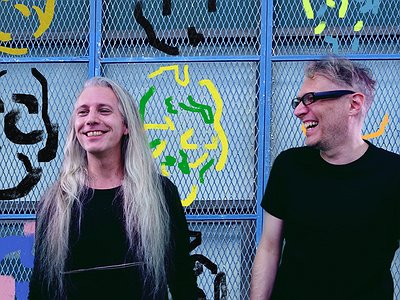Part 3
Music and sounds can heal, but they can also hurt. Do you personally have experiences with either or both of these? Where do you personally see the biggest need and potential for music as a tool for healing?
JB: I think most people have used music to amplify emotions, to feed or soothe emotional pain, to set a mood, to cheer up, to motivate. Each person’s response to music is so personal. Music has an ability to bring people into the present moment, and that can be very healing. One important place where art can do real healing is in education. In the USA, it’s a shame that arts programs are often pulled from public schools. There are so many expensive elite private schools with robust arts programs–because they are valuable! It’s a shame that these educational and emotional benefits are reserved for the wealthy.
DF: That is such a great point. And I would extend that to the powerful programs that have been introduced for incarcerated populations through various initiatives. Music can help us to work through things that are otherwise difficult to grapple with, and it can empower us to express ourselves in ways that we wouldn’t otherwise necessarily be able to do. It both provides a mechanism to connect with others in a fundamental way and also to communicate in very personal and individual terms. It’s a really powerful tool.
There is a fine line between cultural exchange and appropriation. What are your thoughts on the limits of copying, using cultural signs and symbols and the cultural/social/gender specificity of art?
DF: It’s a complicated question, but an important one. For far too long, an oppressive status quo has gone largely unchallenged in the music world, and I think it’s a great thing that we are finally grappling with a lot of difficult and necessary questions. Appropriation is an especially complicated question for a few reasons – perhaps most importantly that no culture (except perhaps historical ones) is a fixed entity. I think the difference between exchange and appropriation has largely to do with issues of power and respect. If your creative process disempowers or diminishes another artist or community, it’s probably time to take a step back and re-evaluate.
JB: Absolutely. It comes down to navigating structures of power and operating with respect.
Our sense of hearing shares intriguing connections to other senses. From your experience, what are some of the most inspiring overlaps between different senses - and what do they tell us about the way our senses work?
DF: I’m interested in how this varies from person to person. For instance, I’m a very aural person. Hearing is so much of how I orient myself and move through the world. Wearing headphones on the subway or walking around the city seems crazy to me, because I would feel so vulnerable by not being able to fully use my ears to know what’s going on around me. However, it only takes looking around a train full of commuters with their earbuds plugged in to make me realize that this is not a universally shared experience.
JB: I wear headphones all the time on the train! I’m addicted to podcasts. I also often appreciate dulling some of the abrasive sounds of NYC. In terms of overlapping senses, I find the overlaps with hearing and physical sensations in the body to be the most fascinating. Seeing the band Sunn O))) perform is a great way to experience this. They play extremely loud and low, and your entire body vibrates. If you get the chance to see them, don’t miss it. (Bring earplugs!) The other fascinating aspect of music and the body is the ability of music to evoke a kinetic response. The fact that music makes us want to move our bodies is a beautiful mystery.
Art can be a purpose in its own right, but it can also directly feed back into everyday life, take on a social and political role and lead to more engagement. Can you describe your approach to art and being an artist?
DF: For me, being an artist just feels like the thing I need to do. At the same time, I realize that anyone who is making a living as a musician invariably has had a lot of lucky breaks along the way, so I am also realistic about the reality that artists – no matter how brilliant or hardworking – are also in the position that they are due to a certain degree of chance. Some artists might find that unpleasant to think about, but for me it’s the opposite – I think it’s empowering to close that gap between myself and that of the people who consume the creative work I put out there. I think there’s a political angle to that as well – artists are workers and as more and more of the economy gets pushed into the ‘gig economy,’ the similarities between our material struggles and those of the average worker will continue to increase. At the same time, I think that when you start from a place where you relate to your audience not as an ‘other,’ but as part of a joint community that listeners are more receptive to whatever messages you are communicating through your piece.
JB: I have struggled with this question for years. I rarely make overtly political art, and I often feel like being an artist is one of the most self-indulgent paths one can pursue. This may come off as sounding cynical, but it’s something I grapple with often. If one is creating art to enact social change, the benefits are obvious. But why should I devote time and energy to aesthetic art-making that isn’t geared toward political and social activism? What good is it doing anyone but me, really? Maybe it gives people a good night out, or gives them an experience of beauty, and those things can be important, but is spending my time creating music really helping anyone? And beyond that, I get paid for it. Money that is going to support my aesthetic pursuits could be going to do real, tangible good in the world. I think art matters, but at times I fall short of being able to convince myself that MY art matters. My uncle, a very inspiring man, once said to me when discussing these questions, “You won’t ever know the good that your music does in the world. You could be changing people’s lives and never know about it.” I think he’s right, but I still question whether or not it’s enough. As I said above, being a composer doesn’t feel like something I do. It feels like something I am, so I will continue grappling with these important questions.
What can music express about life and death which words alone may not?
DF: If I could put that into words, I don’t think I would adequately be answering your question. Suffice to say that there is a reason that ritual so often involves music and why silence can feel so unbearable.
JB: I absolutely agree. I think the amazing thing about music is that it is such an inefficient non-verbal communicator. By that, I mean that music doesn’t share words’ efficiency for direct communication. Musical communication is a language of ambiguity and mystery. Lyrics can add a layer of direct meaning, but the other musical sounds communicate emotion in ways that we do not understand, and in ways that require the presence of the listener to complete the circuit. I can’t ever know what my music is communicating, and that’s beautiful.






